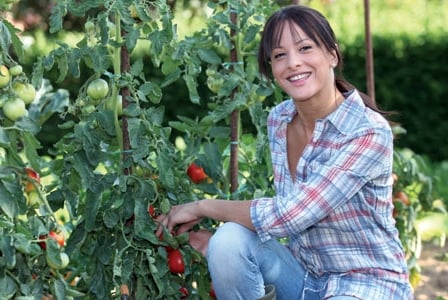
If you want to reduce your carbon footprint by eating locally, check out community farms. Community supported agriculture benefits farmers and consumers.
With the popularity of the 100-mile and zero-mile diets, consumers’ awareness about food’s travel footprint has been raised. People are now looking for their own opportunities to eat locally. Community farming is one solution; it offers valuable benefits to both farmers and food shoppers. Discover the win-win world of community supported agriculture.
What is community supported agriculture?
Community supported agriculture (CSA) is small-scale farming that creates partnerships between local farmers and nearby consumers who become members. This model of food access is a way to get fresh, local (often organic) food at reasonable prices, while also helping to support a local family farm.
By buying a share in the coming year’s harvest, customers receive a regular delivery or pick-up of fresh vegetables, and sometimes fruit, eggs, dairy, meat, or honey. Share prices run about $350 to $750 per year—varying according to the type of farm and the foods ordered. In this way, growers and consumers share the risks and the benefits of food production.
The CSA farming model helps farmers by providing early season cash flow and a guaranteed market for farm products. Consumers reap the benefits too by expanding their culinary horizons and trying new cooking items.
They also gain by tasting fresh, nutritious, in-season food picked at its peak—food that has not travelled thousands of kilometres to get to their plate. By making a direct connection with the farmer, CSA customers support their local economy, including small-scale sustainable agriculture.
Seniors, families, and young singles have been joining. Communication between farmers and the membership is often creatively enhanced with informative, colourfully attractive websites, blogs, and Facebook pages. Activities such as potlucks and recipe sharing have helped to form a community around food.
Fresh, healthy food
BC resident Sonya Sangster recently signed up with Cropthorne Farm, a CSA in the Delta/Vancouver Fraser Valley. “Before I started eating food from the CSA,” says Sangster, “I would go to the store like a robot, pick up food and not really know what was in it or where it came from. I shopped quite a bit in middle aisles of the grocery store, where food has labels a mile long.
“After starting with the CSA, I began having a different interaction with food. I started slowing down in the kitchen, making more time to cook with fresh food, learning new recipes, and enjoying food more. Some CSA veggies were seasonal, local ones that I had never tried before, which made me experiment with new recipes and foods.”
A BC community farm reaps benefits
Cropthorne CSA Farm is run by sisters Lydia and Rachel Ryall. “Our belief about farming is that transparency between the consumer and farmer is necessary,” says Lydia Ryall.
“We encourage our customers to come out to our farm and ask questions. We also believe that working with nature and the natural processes are key to a truly sustainable agriculture system.”
Now in its fourth year of production on three acres of fertile farmland, this farm grows more than 40 types of vegetables, including early leafy greens, beans, and a wide selection of hardy root vegetables. Customers can also choose to add eggs to their basket from the farm’s happy hens out on pasture.
The Ryalls try to add something new every week to the vegetable box, even providing recipes for less common produce. A greenhouse protects sensitive items such as leafy greens and tomatoes, while extending the growing season.
Weekly, starting in June and finishing in late October, customers receive $25 worth of fresh seasonal produce over a 20-week season. Pick-up is at the farm on Tuesdays or at one of Vancouver’s farmers’ markets. Cropthorne Farm also offers its customers an option to use the farm’s “swap box” to switch an item in their vegetable box with a more preferred one.
A Manitoba farm flourishes
Boundary Creek CSA Farm, near Winnipeg Manitoba, is farmed by Geoff and Theresa Dyck. This 80-acre farm has been operating for about 10 years.
“We could not survive without the committed customer base we have established based on the CSA model, or what I call the spirit of CSA,” says Geoff Dyck. “That means our customers help us out by ordering products in advance and being willing to pay in advance. By putting their money on the table, we can raise our crops and animals with confidence, knowing our customers support us and trust us.”
Boundary Creek members receive weekly deliveries of freshly picked vegetables from June until the end of October. The farm grows a wide variety of vegetables and also offers customers foods such as honey, eggs, chickens, and pork. Pick-up is at the farm and there is delivery to Winnipeg locations.
A Nova Scotia farm harvests winter-storage vegetables
Avon River CSA is a small-acreage farm producing quality, diverse wintertime foods. It is farmed by Amy Lounder at Red Fox Farm, located in Centre Burlington, Nova Scotia, an hour from Halifax.
The land has been managed organically for 15 years, with the farm focusing entirely on winter-storage vegetables. Produce is grown each summer, then stored in the farm’s root cellar during winter months.
Beginning in October, shares are available for pick-up in Halifax for an 18-week season. Weekly there are five staples: potatoes, carrots, onions, garlic, and kale or spinach. Combinations of two or three other items are also included: beets, Brussels sprouts, cabbage, celeriac, radish, leeks, parsnips, sprouts, beans, preserves, and herbal teas.
Hundreds of CSA farms have been sprouting up all across Canada. Over 200 thrive in Ontario alone. Farms will vary according to regional growing conditions. Even large urban centres such as Vancouver and Toronto offer CSA delivery.
Canada’s community supported agriculture
| Province | Organization | Contact |
| BC | Farm Folk, City Folk | ffcf.bc.ca/resources/kp/csa.html |
| Alberta | Community Supported Agriculture Alberta | csaalberta.com |
| Saskatchewan | Etomami Community Organic (ECO) Farm | saskecofarm.wordpress.com |
| Manitoba | Manitoba CSA Farms | csamanitoba.org |
| Ontario | Ontario CSA Directory | csafarms.ca |
| Quebec | Equiterre | equiterre.org/en/project/community-supported-agriculture |
| Atlantic Canada | Atlantic Canada Organic Regional Network (ACORN) | acornorganic.org |
| Yukon | Yukon Farm Products and Services | farmproducts.yukonfood.com/organizations.htm |



